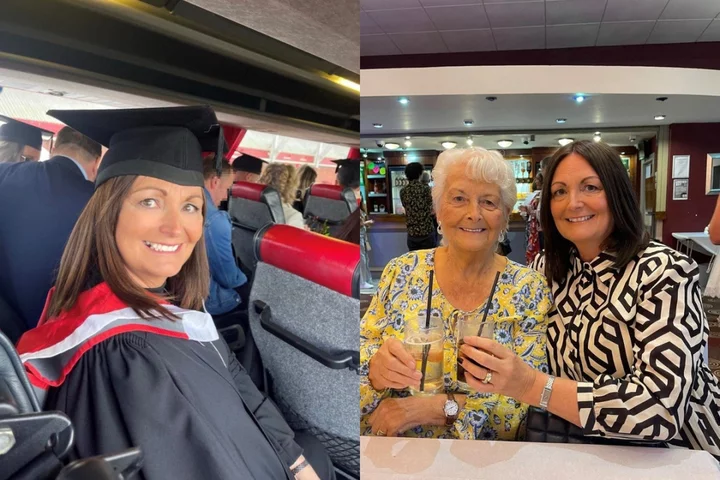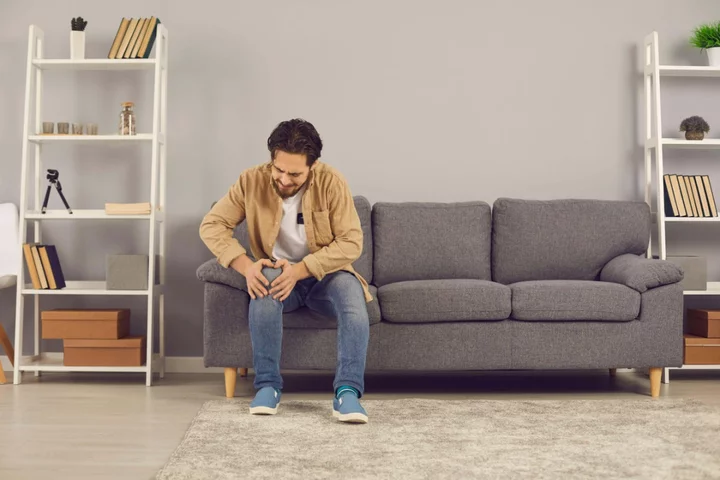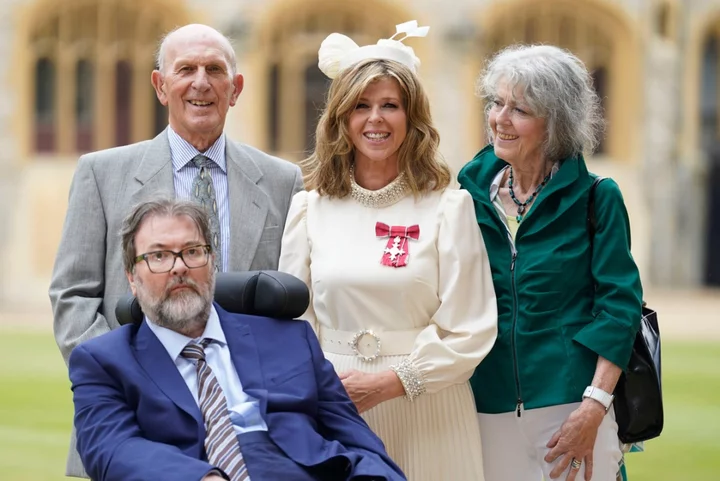
Who Is Playing on Monday Night Football?
Who will play on Monday Night Football in Week 1?
1970-01-01 08:00

Earthquake damages centuries-old sites in Marrakech but spares modern city
A small mosque at the heart of the Marrakech Medina in the city's historical quarter was a treasured place of prayer for the hundreds of traders working at the busy market outside.
1970-01-01 08:00

Mother says ‘don’t ignore’ symptoms after persistent hot flushes led to leukaemia diagnosis
A mother who felt she was being “eaten away” after hot flushes led to an incurable blood cancer diagnosis in her late 50s has urged women not to ignore symptoms. In the summer of 2022, Barbara Geraghty-Whitehead, 58, a school inclusion manager who lives in Cheshire, began to experience hot flushes, dizziness and she developed an ear infection. She said she “put it to the back of (her) mind”, but her symptoms persisted – and eventually, after months of hesitation, she visited her GP in September 2022 and underwent blood tests. Within a matter of hours, she received a phone call from her doctor, saying that they were concerned about how high her white blood cells were and that they suspected it could be cancer. One week later, after further tests, Geraghty-Whitehead was told she has chronic myeloid leukaemia (CML) and it is incurable. “You say you want to carry on as much as normal, but from that second nothing else was going to be normal anymore,” she told PA Real Life. “I wanted to go in and for them to say, ‘No, it was a mistake, it’s something else,’ but they didn’t, they said it was CML.” Geraghty-Whitehead started taking chemotherapy tablets that same day – and despite experiencing side effects of fatigue, nausea, acid reflux, and a loss of taste, nearly one year later she has responded well to treatment and has been able to see her daughter get married in Cyprus. After nearly ignoring her own symptoms, she wants to encourage others not to “make excuses”, as “people need to know the signs so they can get diagnosed early”. “When I was first diagnosed, you don’t know where to start and that in itself is overwhelming, but the support I’ve received has been fantastic,” Geraghty-Whitehead said. “I think about [my diagnosis] every day and it is hard and I do get upset, but now I’ve just got to face the fact that this is the new me. “I’m never going to be the person that I was before but I’m going to recreate the new me.” Geraghty-Whitehead said she almost ignored her cancer symptoms and attributed her hot flushes to warm weather and “thought no more of it”. She said she did not think it was related to menopause, as she had already been taking hormone replacement therapy (HRT) patches for years to treat her bone pain. “I started not feeling right and I couldn’t figure out what it was, but I didn’t do anything about it – I just left it,” she explained. She added: “I never ever got hot flushes. Even though I was put on HRT patches, it was mainly for my bone pain, so I just put it to the back of my mind and I thought no more of it.” Looking back now, she realises she should have acted sooner – but on September 16, she visited her GP and underwent blood tests. Days later, on the day of the Queen’s funeral, she found herself sat in an empty hospital waiting room, preparing for further blood tests – and by the end of that week, on September 23, Geraghty-Whitehead received the news she has CML and the following minutes felt like “a blur”. “Everything happened so fast, it was just like a roller-coaster,” she said. “I think it was worse waiting for the blood test results because I didn’t know what type of cancer it was, whether I was going to live, whether I was going to die. “But all I wanted was to get the very first tablet into my body, as I felt like I was being eaten away because it was in my blood and your blood travels everywhere.” Geraghty-Whitehead started treatment the same day she was diagnosed, which she said was the “first positive move”. Although she was told her CML is incurable, doctors reassured her other patients had responded well to the chemotherapy tablets she needed to take daily, and this gave her hope. For more information and support, visit Leukaemia Care’s website here: leukaemiacare.org.uk Read More 9 arthritis myths we all need to stop believing What happens at a sexual health check-up? 9 key signs of leukaemia, as awareness is called ‘non-existent’ Cancer-hit dad who planned own funeral outlives three-week prognosis What happens at a sexual health check-up? 9 arthritis myths we all need to stop believing
1970-01-01 08:00

9 arthritis myths we all need to stop believing
Many people assume arthritis is just an ‘old person’s’ disease, and an inevitable part of getting older. Try telling that to the parents of toddlers impacted by the condition, or the 20-somethings living with it. The suggestion that it only troubles the elderly is one of many myths associated with arthritis, which affects around 10 million people in the UK. “One in six people live with the pain, fatigue, and disability arthritis can cause. The impact can be huge, affecting the ability to work, care for family, move free from pain and live independently,” says Deborah Alsina, chief executive at the arthritis support charity Versus Arthritis, speaking to mark Rheumatoid Arthritis Awareness Week (September 11–17). “There are many misconceptions when it comes to understanding arthritis, but by shining a light on the reality of living with arthritis day in, day out, we can help grow understanding and inspire people to take action.” Dr Amara Ezeonyeji, consultant rheumatologist from The Lister Hospital in London (part of HCA Healthcare UK), adds: “Arthritis is a general term that refers to a group of over 100 different types of inflammatory joint diseases that affect the musculoskeletal system. The most common symptom of arthritis is joint pain, but it can also cause stiffness, swelling, and decreased joint mobility.” She says the most common form of arthritis is osteoarthritis (OA), often associated with wear and tear of the joints. Other common types are rheumatoid arthritis (RA), an autoimmune disease that primarily affects the joints; psoriatic arthritis, a type of arthritis associated with the skin condition psoriasis; ankylosing spondylitis which primarily affects the spine and can lead to fusion of the vertebrae; and gout, which is caused by the accumulation of uric acid crystals in the joints and often affects the big toe. “There are several myths about arthritis that are often repeated. It’s important to dispel these to promote an accurate understanding of arthritis, and to encourage those affected to seek appropriate medical care and support from a rheumatologist,” Ezeonyeji adds. Here, Alsina and Ezeonyeji debunk nine common arthritis myths… Myth 1: Arthritis only affects the elderly While it is more common in older adults, arthritis can affect people of all ages, including children and young adults. Myth 2: Cracking your knuckles causes arthritisPeople who crack their knuckles will sometimes be wrongly warned that it’ll bring on arthritis, but Ezeonyeji explains: “There’s no scientific evidence linking knuckle cracking to the development of arthritis. When people crack their knuckles, they experience a release of pressure in the joints and relaxation in the surrounding muscles. It can make the joint feel more mobile and is unlikely to cause arthritis or other problems.” Myth 3: It’s just wear and tearAlsina says one of the most damaging myths is that any form of arthritis is just ‘wear and tear’. “Osteoarthritis is the most common type of arthritis and will affect half of us by age 70. But it isn’t an inevitable part of ageing – your joints are not like car tyres destined to wear down and be replaced. They are made of complex living tissue that our bodies constantly repair and maintain, and osteoarthritis occurs when our bodies can no longer do this effectively,” she says. “Our joints get stronger the more we use them, so keeping physically active and maintaining a healthy weight can help keep osteoarthritis under control.” Myth 4: Cold damp weather causes arthritisAlthough cold and damp weather can sometimes make arthritic joints feel worse, it’s definitely not why arthritis starts. Ezeonyeji explains: “Weather can influence joint discomfort, but it doesn’t cause arthritis. Arthritis is primarily a result of genetic and environmental factors.” Myth 5: Exercise makes arthritis worse People with arthritis can often find it hard to maintain regular physical activity, but a lack of movement can actually increase symptoms such as stiffness and pain, warns Alsina. “Building activity into your daily routine can help improve this, because using your joints builds muscle strength and improves the blood supply, all of which can ease symptoms and keep joints in better shape for longer.” She says different activities will suit different people, but adds: “Swimming and cycling are great exercises to try, as they get the body moving without putting pressure on painful joints.” It’s always a good idea to seek advice from a healthcare specialist if you are unsure what types of exercise will be suitable for you. Myth 6: Arthritis is just joint pain – it’s not serious Ezeonyeji says that while arthritis can be debilitating and lead to a reduced quality of life, it can get even more serious than that for some people. “Rheumatoid arthritis, for instance, is an autoimmune disease that can affect various organs and tissues in addition to joints,” she points out. Myth 7: There’s no treatment for arthritis While there’s no cure for arthritis, Ezeonyeji says there are many effective treatments for managing the disease, including pain relief medication, physiotherapy, disease modifying agents and biological drugs for inflammatory arthritis, plus joint surgery in some cases. “It’s also recommended that people with arthritis modify their lifestyle and try to lose weight [if they need to], follow a healthy balanced diet, exercise regularly and stop smoking,” she adds. Myth 8: Miracle cures can make arthritis disappear Although some people with arthritis believe copper or magnetic bracelets ease symptoms, Alsina says studies show no evidence to support this. “It’s the same with lots of supplements, and some of these are really pricey,” she observes. “Interestingly though, placebos can be very effective and continue to work even if you know it’s a placebo, so if you find these helpful there’s no reason to stop.” Myth 9: Certain foods definitely help/hinder arthritisThere are claims that foods like tomatoes can cause arthritis flares, and other foodstuff like cider vinegar may help it. Alsina says: “Sadly there’s no good evidence that there are specific foods you should avoid or have more of. But if you do find things that are helpful or make your symptoms worse, then listen to your body.” Read More Charity boss speaks out over ‘traumatic’ encounter with royal aide Ukraine war’s heaviest fight rages in east - follow live Prince Harry spotted at Windsor Castle on anniversary of Queen’s death How the weather can change the way you dream All the times Kate has channelled the late Queen’s style since her death
1970-01-01 08:00

Egypt angry as Ethiopia fills Nile dam reservoir amid water row
Ethiopia's giant hydroelectric dam on the Blue Nile stokes Egyptian fears of dire water shortages.
1970-01-01 08:00

Heisman Power Rankings 2023, Week 2: Shedeur Sanders hype grows, Quinn Ewers makes statement
Week 2 saw Shedeur Sanders another great performance for Colorado, while Quinn Ewers led Texas to an upset win over Alabama. Let's look at who rose and who fell in the latest edition of the Heisman Trophy Power Rankings.
1970-01-01 08:00

‘I think sickness is selfish’: Kate Garraway opens up about realities of caring for husband Derek Draper
Kate Garraway has opened up about the realities of caring for her husband, Derek Draper, in a new interview. A former lobbyist, Draper, 55, was left with long-lasting organ damage after falling seriously ill with Covid-19 in March 2020. After spending more than a year in hospital with Covid from March 2020 to April 2021, partly in an induced coma, he has been in and out of hospital since then for various treatments, including in October 2022 after he contracted sepsis. Now, speaking to The Sunday Times, Garraway, 53, has spoken at length about Draper’s condition, the constant care he requires today, and the toll it takes on her. Currently, Draper has no physical mobility and needs to be held upright by two people five times a day in order to bear any weight. “Being upright is incredible for the brain,” Garraway explained. “We’re meant to be upright – you don’t want your brain to adjust to being flat.” However, a lack of progress has taken a toll on them both. “The truth is he’s terribly, terribly depressed,” the Good Morning Britain presenter added. “I think sickness is selfish,” she continued. “Selfish in the sense that it does strip you of your empathy. He does get very emotional about the strain this has put on me. “But when someone’s body doesn’t work, their brain can’t make anything or anyone else a priority.” Garraway went on to speak about how, as his condition progresses, those around her have become increasingly concerned. “My friends worry that I can’t spend my life forever attached to whether Derek is having a good or bad day, for my own sanity,” she said. “So I’ve got to create a bit of headspace. But we’ve never had a period where we could say, ‘Well, at least he’s safe now.’” The interview comes after Garraway was made a Member of the Order of the British Empire (MBE) by the Prince of Wales at Windsor Castle in June. The presenter was recognised in the 2022 New Year Honours for her services to broadcasting, journalism, and charity. Draper was able to attend the investiture ceremony in his wheelchair, wearing a blue suit and stripe tie. Garraway wore a cream dress with a bejewelled collar and a matching headpiece. When it was announced that she had been awarded the accolade, Garraway said on GMB: “I actually feel very awkward about it all really, I don’t know why, because I’m thrilled to bits and incredibly honoured. “But you just sort of think, ‘What? Me?’, and then you think it’s not real.” Read More Kate Garraway’s husband Derek Draper admitted to hospital after MBE ceremony Derek Draper watches as wife Kate Garraway collects MBE from Prince William Susanna Reid shares message on GMB for Kate Garraway and Derek Draper after Elton John tribute Father praised for ‘embarrassing’ dance when picking daughter up from high school What are Blue Zones and how do they impact your health? Hairspray star reveals she went into labour while attending Beyoncé concert
1970-01-01 08:00

Ukraine war: Kyiv foils big Russian drone attack, officials say
Ukraine's capital is showered in debris from intercepted Russian drones, city officials say.
1970-01-01 08:00

College football rankings 2023: Projected Week 3 AP Top 25 after Texas upsets Alabama, Colorado rolls again
Projected AP Top 25 college football rankings for Week 3 after Texas upset Alabama in dominant fashion, UNC and Oregon held on for dear life, Ohio State looked average again, and more from Week 2.
1970-01-01 08:00

Notre Dame coaches spent rain delay like many fans: At the concession stands
The Notre Dame Fighting Irish coaching staff had to buy food from the concession stands for their players after not having enough during the lengthy rain delay.
1970-01-01 08:00

Notre Dame vs. NC State weather delay updates: When will game restart?
Notre Dame and NC State had to leave the field due to lightning strikes in the area. We've got the latest updates on the weather delay.
1970-01-01 08:00

Morocco earthquake: What we know
A look at what is known about the quake that has claimed the lives of more than 800 people.
1970-01-01 08:00
